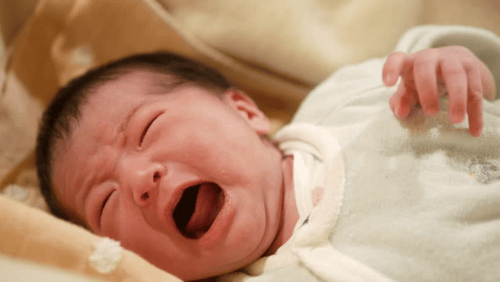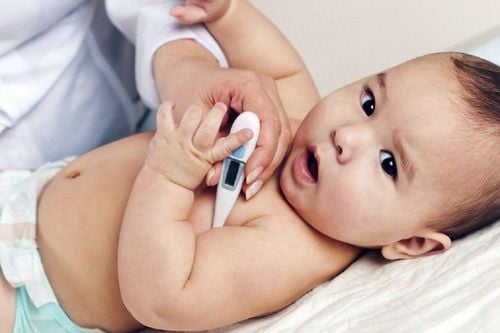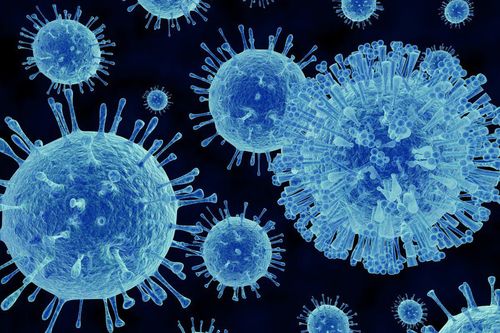This is an automatically translated article.
Viral fever in children is also known as viral fever. The virus can be transmitted by inhalation or ingestion. Parents can recognize signs of viral fever in children through symptoms such as: high fever, body aches, cough, runny nose, diarrhea,... Viral fever in children can go away after 5 - 7 days without antibiotics.1. Signs of viral fever in children
Viral fever is a common disease in children due to the immature resistance. The virus that causes the disease can be transmitted through the respiratory tract, digestive tract and outbreaks into epidemics. There are about 200 different viruses, so each child can have viral fever many times, the most common are Myxo virus, Coxackie, Entero virus, measles virus, chickenpox, Japanese encephalitis virus,... Signs Symptoms of viral fever in children usually subside after 3-5 days and completely disappear after 7 days. In order to properly identify the disease and have appropriate care, parents need to pay attention to the symptoms of viral fever in children as follows:High fever: How to recognize viral fever in children compared to other respiratory diseases is a child with a high fever above 39 degrees Celsius, even a fever up to 41 degrees Celsius. This is the most typical symptom of a viral fever. High fever usually appears 3-5 days after the onset of illness and subsides. During a fever, children are often tired and less responsive to common fever-reducing medications.
Body pain: Besides high fever, muscle pain, body pain, headache... are symptoms of viral fever in children besides high fever. This makes the baby tired, fussy.
Digestive disorders: In some cases, children have viral fever with digestive disorders with loose stools, mucus, no blood. Gastrointestinal disturbances may appear at the same time or as late as several days after the fever.
Rash : The rash usually appears 2 - 3 days after the fever and goes away on its own without scarring.
Inflammation of the respiratory tract: Cough, runny nose, sneezing, appearance of lymph nodes in the head and neck, vomiting a lot... are manifestations of viral fever in children that parents can easily confuse with respiratory diseases. . However, respiratory diseases caused by bacteria require antibiotic treatment, while viral fever can be cured without antibiotics. Therefore, parents should take their children to medical facilities for examination to properly detect the disease and then take appropriate treatment measures.
Trắc nghiệm: Sự phát triển tinh thần, vận động của bé thế nào là đúng chuẩn?
Khi nào bé biết nói, biết hóng chuyện hay biết cầm cốc là "đúng chuẩn"? Điểm xem bạn biết được bao nhiêu mốc phát triển tinh thần, vận động "đúng chuẩn" của bé nhé!The following content is prepared under supervision of Thạc sĩ, Bác sĩ y khoa, Ma Văn Thấm , Nhi , Phòng khám Đa khoa Quốc tế Vinmec Dương Đông(Phú Quốc)
2. What complications can viral fever in children cause?
Not all cases of viral fever cause a high fever. Some cases of viral fever in children show only mild fever. If parents do not monitor closely, complications can occur such as: pneumonia, myocarditis, laryngitis, cardiac arrhythmia... The most dangerous is viral fever that can cause complications in the brain causing the child to convulse. convulsions, coma, leaving sequelae if not treated promptly.
3. Taking care of children with viral fever
Currently, there is no specific medicine to treat viral fever in children. Therefore, treating children's fever by improving their physical condition, strengthening their resistance, treating symptoms and preventing complications of the disease. Most viral fevers are benign and can go away after 5-7 days. As soon as there are signs of viral fever in children, parents should:In case the child has a fever below 38.5 degrees Celsius: apply a cool compress to the child, dry the sweat, let the child wear thin, cool clothes. In case of fever of 38.5 degrees Celsius or higher, give children antipyretic drugs prescribed by the doctor, usually oral antipyretics with a dose of 10-15mg/kg/time when the fever is over 38.5 degrees Celsius, spaced apart. 4-6 hours.
In case the child has a fever above 39.5 degrees Celsius or has a history of convulsions, parents can use anal medicine to reduce fever and cool with warm water for 30 minutes. If the child has a convulsion, parents should keep the child in a safe place, resting the child's head on a soft pillow to reduce mucus.
Give children plenty of water to drink, supplement with easy-to-digest foods such as soup, fruit juice, porridge... Monitor for signs of severe illness to take the child to a medical facility promptly.
Need to take the child to the doctor immediately if there are signs:
High fever continuously for more than 2 days, does not respond to antipyretic drugs. Lethargy, sleeping a lot, lethargy, headache. Presence of febrile convulsions. Nausea, vomiting many times.

4. Prevention of viral fever in children
Viral fever is a highly contagious disease. Therefore, when there is a viral fever epidemic, parents need to take precautions against viral fever to protect the health of their children. Some principles of viral fever prevention include:Children infected with the virus should be absent from school to avoid spreading it to other children. Supplement with adequate nutrition and vitamins to increase the body's resistance for children. Keeping the house clean and tidy, keeping the living environment clean and well ventilated. Keep children's hygiene, do not let children suck hands and toys, regularly wash children's hands. Limit going to crowded places. Keep children warm when going out in rainy, cold weather. If the child has signs of viral fever in children such as cough, runny nose, high fever, etc., it is necessary to take the child to a medical facility for examination and treatment by a doctor, to avoid spreading it to siblings in the house and other children. classmate. Currently, there are vaccines for some diseases caused by viruses such as Japanese Encephalitis Vaccine, Measles - Mumps - Rubella... Parents should take their children to be vaccinated fully and on schedule to prevent disease and create a healthy environment. immunity in children.
Vinmec International General Hospital is currently providing a Package Immunization Program with a variety of vaccines for the following subjects: 0-1 year old vaccine package, 0-2 year old vaccine package, . ..
To prevent viral fever and other diseases in children, parents should add some supportive foods containing lysine, essential micro-minerals and vitamins such as zinc, chromium, selenium, group vitamins. B, ... help meet the needs of nutrients while supporting the immune system, enhancing resistance, reducing the risk of upper respiratory tract infections, bronchitis, flu.
Lysine is very necessary for the development of children, Lysine promotes the production of digestive enzymes to stimulate children to eat better and digest easily and effectively, increase food metabolism, maximize absorption of nutrients. Nutrition from food. Fortifying lysine for babies also helps the body create antibodies, develop resistance to help reduce cough, thin phlegm in children.
Parents can learn more:
Why do you need to supplement Lysine for your baby?
Please regularly visit Vinmec.com website and update useful information to take care of your baby and family.
Please dial HOTLINE for more information or register for an appointment HERE. Download MyVinmec app to make appointments faster and to manage your bookings easily.














